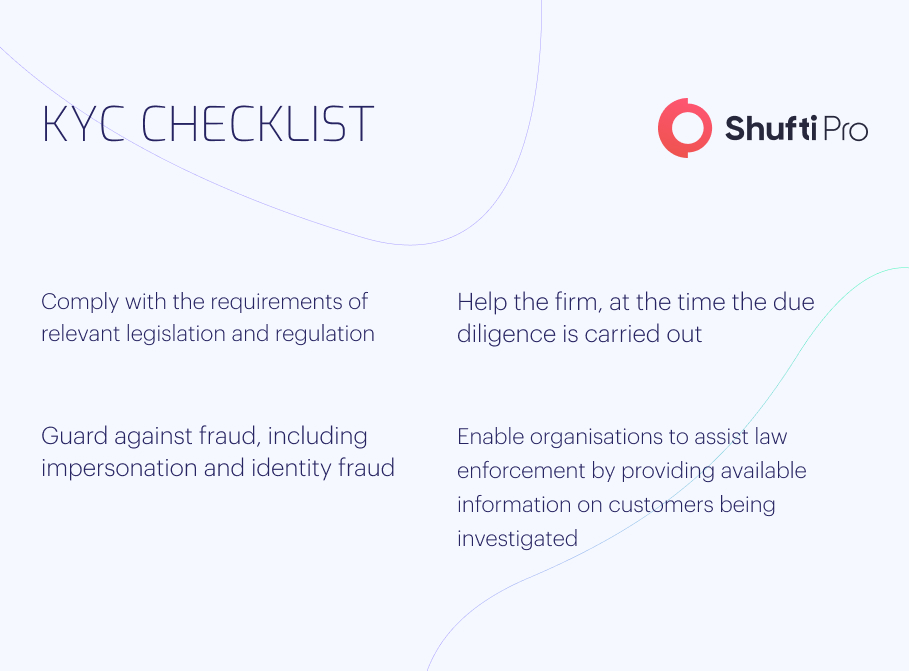Cross-Border KYC Compliance | Understanding and Overcoming the Challenges

To handle money laundering incidents and rising regulatory pressure, the banking industry benefits from a fundamentally different KYC compliance approach. Increasing the efficiency and effectiveness of Know Your Customer (KYC) and Anti-Money Laundering (AML) procedures, a centralised utility can help lower fraud risks. This method significantly enhances the ability of financial institutions to detect money laundering by providing a more comprehensive picture of consumer behaviour.
The UK’s banking institutions were fined $672 million in 2021 for failing to comply with Know Your Customer (KYC) and Anti-Money Laundering (AML) requirements. Financial institutions are subject to additional regulatory reviews as regulators prioritise financial crime compliance. As a result of the continued use of antiquated models in business, concerns have been raised about the efficacy and efficiency of KYC regulations. Increased expenditures, inefficient operations, and sophisticated technology not fit for purpose make it difficult for financial institutions to achieve KYC compliance standards, exposing them to compliance risks and regulatory fines.
KYC-AML Utility Models
There have been three main approaches proposed for this kind of utility. The advantages vary from one legal framework for banking operations to the next.
Model 1: Static KYC–AML data
This service facilitates data sharing among participating financial institutions. Beneficial owners and retail consumers are two examples of the information that would make up the static KYC data. Customer blacklists, whitelists of reviewed and “safe” customers, PEP status, and sanctions status are all examples of data that could be used in AML investigations. A centralised onboarding platform can enhance and simplify the onboarding procedure for all users in this configuration. Instead of directly asking new customers for KYC and AML details, banks can get this data through the utility.
Model 2: Transaction-analysis AML
By centralising encrypted transaction data in an analytical solution, such a tool enables high-level monitoring and screening of a much more extensive network of transactions. When given such authority, financial institutions can dramatically lower AML risk.
Model 3: Full-service AML utility
This framework facilitates the implementation of customised solutions by member institutions to enhance the effectiveness of specific AML procedures. Members’ banks have operational sections that do further customer due diligence and credit checks.
Banks can profit from all three models. Benefits accrue more when more data is shared throughout the system. However, the third model would likely need to be constructed in phases because it is an outsourced utility. A data repository or transaction-analysis capability would be the first baby step due to the complexity of banking systems and standards.

KYC Compliance Challenges
It has been widely argued that the cost and effort required for KYC compliance are disproportionately high for smaller financial institutions. This is because of the law’s vagueness, which requires firms to conduct self-audits and formulate suitable action plans, which is easy for giant corporations with in-house legal departments but more affordable for small enterprises. An ever-expanding collection of recommendations, regulations, and vigilant enforcement, cost, and quality remain a rigorous restraint for all organisations, not just those in the financial sector.
Regulatory Changes
The regulatory norms around KYC are complex and subject to frequent change, providing difficulties for C-suite executives during daily work. With the development and diversification of financial crime, it has become increasingly more work for KYC regulations to keep up. Further complicating the sector and making it harder for C-suite executives to carry out senior management obligations is the difficulty in determining whether regulation components apply to a particular financial institution.
Operational Agility
Establishing and maintaining operational agility in the face of KYC compliance is a massive issue for unprepared firms. Due to the rapid pace at which KYC requirements are evolving, businesses must act swiftly to avoid the consequences of falling out of compliance. Maintaining legal compliance in this way requires high operational readiness and reactivity, as new procedures must be developed, polished, and distributed rapidly.
Particularly for larger financial institutions, the inability to quickly adapt might expose them to dangers, including fraud and regulatory violations. Creating and keeping up an operational framework to promptly address KYC changes can be difficult and expensive. Either you hire a team of highly skilled specialists, or you risk working with contractors who are often more costly and less experienced and need company loyalty to push them to do high-quality work.
High Rates of Turnover and Available Resources
Continuous regulatory changes alienate those who work in the KYC industry, contributing to the already high turnover rate within the field. Employees in this industry need help persevering through low STP levels and muddled policies, tedious task assignments, and slow benefits from automation projects hampered by poor data quality and missing package functionality. Because of this, employees in the technology industry may switch jobs frequently in search of better income and job security. High employee turnover and persistent difficulties in filling open positions in the IT industry make doing business difficult.
According to a Microsoft survey, more than 60% of business leaders have needed help bringing on board talented new employees. The difficulty of finding and hiring new personnel inside KYC is a significant roadblock to implementing many potential solutions. Knowledge gaps persist with educated people in strategic positions, operational agility is greatly improved, and regulatory changes may need to be recognised.
Technology-Related Skill Deficiency
The rapid evolution of KYC requirements and associated best practices can leave unprepared financial institutions woefully unable to meet the challenges of the new landscape. According to a recent survey, more than a quarter of workers are concerned they do not have the necessary digital skills for jobs. Failure to comply with regulations due to insufficient employee training can hurt profits and expose the company to severe reputational damage in the event of a data breach. This cutting-edge work involves artificial intelligence, two areas not typically associated with risk, regulatory, compliance training and development.
How to Plan for Future Market Challenges
The cross-border trade of technology, information, financial services, and investments is rising, and the world’s cultures, populations, and economies are becoming increasingly intertwined as a result. The accelerating growth of globalisation has brought the inevitable challenge of cross-border compliance for businesses and financial institutions that deal with customers in other countries. There must be more wiggle room regarding the rigorous regulatory implications of failing to ensure compliance across several borders.
Compliance training and continuous monitoring are also essential components of a practical cross-border framework alongside regulatory advice in the form of policies and manuals. Many multinational corporations refocused their operations in response to the pandemic, necessitating the development of cross-border compliance frameworks that could account for both traditional and online trade. A tedious and never-ending procedure is checking investment proposals for country-specific constraints and getting up-to-date, accurate, and reliable compliance information.
Slash rising overhead expenses by making internal procedures more scalable. This is especially important when a company’s client base is affected by new regulations. This can leave companies with a bloated operational core during quieter times and drive up costs dramatically when ramping up manual operational processes. Businesses can discover the scalability they need to flourish by partnering with providers supporting technology-based solutions and flexible managed services.
How Can Shufti Help
Shufti offers a robust solution for cross-border KYC compliance with its advanced identity verification features. Leveraging cutting-edge anti-spoofing detection and behavioural analysis ensures instant and accurate customer identity verification. Operating across 230+ countries, it employs cross-referencing different documents for added security. Its multilingual OCR extraction also supports over 150 languages, whilst its fraud detection capabilities guard against synthetic identity fraud. With its fortified facial authentication and comprehensive features, Shufti establishes a strong defence against unauthorised access and fraudulent activities, facilitating seamless and compliant global business operations.
Want to know more about how Shufti helps financial organisations in cross-border KYC compliance?











